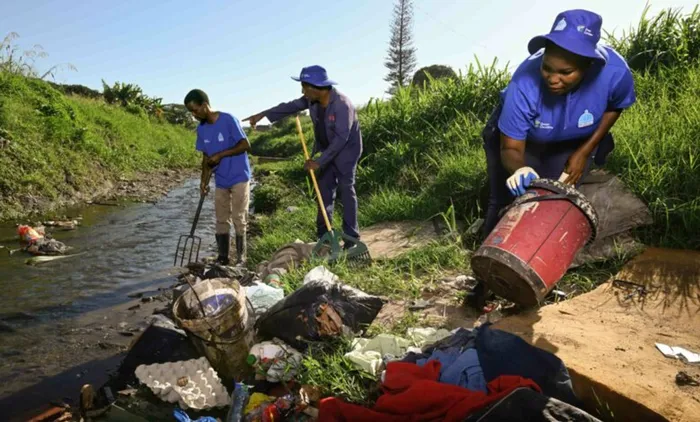Green Corridors encourages water-conscious practices

Members of the Green Corridors team clean a river.
NPO Green Corridors is rallying citizens to adopt water-conscious practices, in a bid to foster sustainable water management and equitable access to water.
As the world commemorates World Water Day under the theme Water for Peace, aligning with South Africa’s National Water Week (March 20 to 26), Green Corridors, known for its collaborative efforts in connecting communities with environmental stewardship, is urging Durbanites to recognise their role as custodians of water resources.
Musa Shange, a representative of Green Corridors, emphasised the organisation's commitment to various Sustainable Development Goals (SDGs), targeting universal access to clean water and sanitation by 2030.
Shange highlighted the diverse projects undertaken by Green Corridors, focusing on educating and empowering resource-constrained communities while restoring natural habitats for the benefit of both people and the environment.
“Green Corridors is motivated by numerous Sustainable Development Goals (SDG), including SDG 6, that aims for clean water and sanitation for all by 2030. Green Corridors works on a number of project areas that educate and empower communities that lack resources and help them to restore natural areas for the benefit of both humans and the environment,” says Mr Shange.
The organisation’s Green Spaces team recycles waste caught by its innovative litter booms on many of the City’s riverways, stopping the waste from reaching the sea. Working with surrounding communities, Green Corridors clears spaces that have been used as dump sites and restores them to their natural states as well as helps to develop market gardens in urban areas.
Green Corridors’ work also includes developing natural sites for eco-tourism with a goal of supporting economic development.
“We need citizens to be increasingly mindful of practices that can impact water quality and how this affects fellow citizens and natural resources, too,” said Mr Shange.
“We see the on-going devastation of our rivers and streams and the natural spaces around them brought about by alien invasive plants and irresponsible waste disposal that contaminates water and harms surrounding communities and ecosystems,” he said.
Mr Shange said the recent dumping along Riverside Road near the Green Corridors material-recycling facility site at Connaught Bridge was a case in point.
“So much of the waste illegally dumped will end up in the uMngeni River and, ultimately, onto the beaches and in the ocean,” he said.
Mr Shange said Green Corridors stressed the importance of collective action to address water-related challenges, that were intrinsically linked to effective waste disposal.
“The organisation embodies this ethos through safeguarding water sources essential for local livelihoods and, importantly, tourism in eThekwini,” he said.
“The UN World Water Day campaign this year explains that when water is scarce or polluted, or when people struggle for access, tensions can rise; that water co-operation needs to be at the heart of the plans for conflict resolution, and that harmony can be fostered between communities and countries by uniting around the fair and sustainable use of water – including actions at the local level.”
Green Corridors has partnered with numerous organisations, including WESSA and Adopt-a-River, with support from SAPRIPOL, PETCO and RMB, other conservancies, eThekwini Municipality Cleansing and Solid Waste, the Parks Department and Sihlanzimvelo co-ops, to remove alien plants and waste to restore water health.
“Much of the organic and non-organic waste materials are collected through the Roadhouse Crescent Materials Recovery Facility at Connaught Bridge and litter booms on the rivers. This is then processed at the KwaMashu Materials Beneficiation Centre where products, such as pavers, compost and building materials, are being produced from this waste,” said Mr Shange.